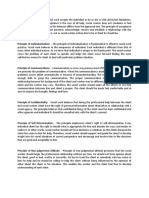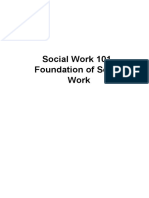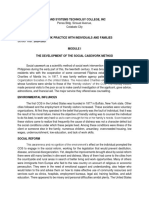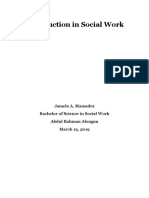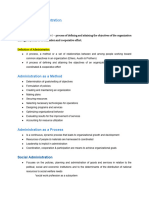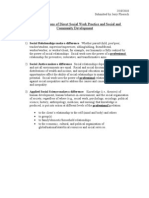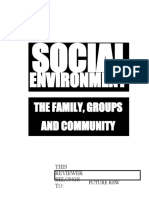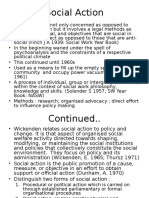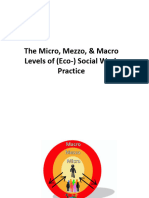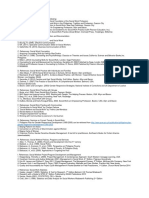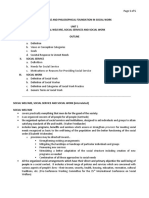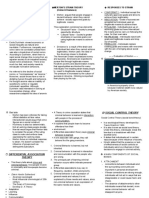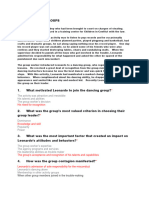Professional Documents
Culture Documents
SW101 Lesson-3 (Module 2)
SW101 Lesson-3 (Module 2)
Uploaded by
Mia PerocilloOriginal Description:
Copyright
Available Formats
Share this document
Did you find this document useful?
Is this content inappropriate?
Report this DocumentCopyright:
Available Formats
SW101 Lesson-3 (Module 2)
SW101 Lesson-3 (Module 2)
Uploaded by
Mia PerocilloCopyright:
Available Formats
Module 2: Philosophical Foundations of Social Work Profession
Lesson 3: Elements/Components of Social Work Practice
Intended Learning Outcome
At the end of the lesson, you are expected to:
Discuss the essential elements of social work practice
Activate Prior Knowledge
Why a certain individual would seek for a professional help from a social worker?
_____________________________________________________________________________________________________
______________________________________________________________________________________________________________
_____________________________________________________________________________________________________________
Acquire New Knowledge
Trained or Professional social workers often find it difficult to explain to the public or
even to their friends and families what they do and what social worker practice is all about.
They are often most visible during crises or emergencies and are seen monitoring or giving out
material aid. It is therefore not surprising at all that the public image of social workers is that of
a charity worker handing dole-outs. So, in this lesson the essential elements or components of
social work practice will be discussed in order to provide a clearer understanding of social work
as a profession for which one must possesses basic scientific knowledge, appropriate values,
and the skills necessary for helping people in distress.
There are four (4) major elements of social work practice, the:
CLIENT
PROBLEM
AGENCY
HELPING PROCESS
Helen Harris Perlman, an American author, refers to these as the “4Ps” meaning the
Person, the Problem, the Place and the Process.
SW101: Knowledge and Philosophical Foundations of Social Work Profession
Module 2: Philosophical Foundations of Social Work Profession
THE CLIENT/ PERSON
Is an individual (man, woman, or child), a family, small group or community who finds
himself or is found to be in need of help in some aspects of his economic, social and
emotional living.
The person who applies or is referred for help at a social welfare agency is called a
CLIENT not a beneficiary or recipient of alms, nor the indigent , needy or poor.
In social work, the moment a person with a problem request for help and is qualified is
called a CLIENT.
The person should be viewed as biopsychosocial being which means that human being
is at least made up of three parts or subsystems. Each part is affecting and in turns
isbeing affected by the others. Thus, it is the totality as a system that determines the
persons functioning rather that individualized operations of the system.
o Thus, to be able to help the person, the worker needs to know the following:
Nature of the person – physical, emotional and psychological factors
Nature of the problem – social, economic and cultural factors/reasons
Types of clients:
Abandoned, neglected, orphaned, abused or exploited children
Youth with behavior or emotional problems
Jobless poor unemployed family heads
Disadvantaged women
Adults without any means of support
Single or solo parent
Married couples or member of families with problems of relationship
Physically, socially or mentally handicapped – persons with disabilities
Elderly without families
Displaced persons
Victims of natural and man-made calamities and disasters
Victims of armed conflicts
Why a person seeks for a professional help?
Person’s inability to handle stress produced by a distress situation or problem.
The person who has a problem is under stress. The stress produces physical or
psychological strain or disruptive influence on the person making him unable to
function normally.
THE PROBLEM
Is a question or situation that presents uncertainty, perplexity, or difficulty.
The problem arises when the individual’s need has not been met or there are obstacles
to its fulfillment.
SW101: Knowledge and Philosophical Foundations of Social Work Profession
Module 2: Philosophical Foundations of Social Work Profession
Need – is a condition or situation in which something is necessary or desirable is wanted or
required so that the person may function satisfactorily.
Listed below are the problems most often presented to social workers in the Philippines.
1. Lak of economic and social resources
o It refers to the total lack of income or a very inadequate one.
o It means lack of the basic necessities of life: food, shelter, and clothing, because
the person has no means of livelihood, work or job which would assure him of an
adequate and stable income.
2. Lack of education and skills, knowledge and experience
3. Lack of love, care, and protection
4. Illness and disability
5. Lack of opportunities or access to resources
6. Psychosocial Problems
o Emotional reaction to stress
o Loss of relationship
o Interpersonal conflict
o Culture conflict
o Maladaptive group functioning
THE AGENCY
(PLACE)
Social welfare agency set up by the government or private sector to deal with the social,
personal problems of individual human beings who are experiencing some problems in
the management of their lives.
Social agency is the place to which a person comes for help.
Function of the Agency:
To provide the needed resources to meet client’s problem
Social agencies are classified according to items:
1. Source of support
o The possible sources of support of an agency are taxes, donations and
contributions from individual and entities.
Type of Agencies according to its support:
1.1 Public Agencies (GAs) – supported by taxes
1.2 Private Agencies (NGOs) – donations and contribution
1.3 Semi-government – example Philippine National Red Cross
2. Source of Professional Authority
SW101: Knowledge and Philosophical Foundations of Social Work Profession
Module 2: Philosophical Foundations of Social Work Profession
o A public agency derives its professional authority by LAW.
Classification of agency according to source of professional authority:
1. Primary agency or setting – one which carries full authority and responsibility for its
social welfare functions. (e.g DSWD)
2. Secondary agency or setting – one which is a part of another human service or social
organization. (e.g HOSPITAL)
3. Special function or area of concern (e.g SALAG- Rehabilitation Center)
THE HELPING
PROCESS (PROCESS)
The last and the most important component of social work practice is the helping
process.
It means through which an agency’s purpose is achieved; it is the means through which
intervention is applied to attain change in behavior or in the environment, or a problem
is alleviated or resolved.
Series of actions, changes or functions intended to bring about the goal previously
agreed upon.
Application
After reading the elements/components of social work practice, Give one example for
each of the following:
1. Identify a client
2. What is the problem? (State the nature of the problem)
3. Possible agency where the client can be helped
4. Action to be taken
Assessment
Briefly explain the four (4) components/elements of social work practice according to
Helen Harris Perlman.
_____________________________________________________________________________________________________
______________________________________________________________________________________________________________
______________________________________________________________________________________________________________
______________________________________________________________________________________________________________
______________________________________________________________________________________________________________
_____________________________________________________________________________________________________________
SW101: Knowledge and Philosophical Foundations of Social Work Profession
Module 2: Philosophical Foundations of Social Work Profession
Rubrics in checking essay:
Criteria Point Weight
Ability to express ideas accurately 10
Critical Thinking 10
Correct grammar and spelling, neat and 5
readable
TOTAL 25
SW101: Knowledge and Philosophical Foundations of Social Work Profession
You might also like
- WGU C200 Task 2Document20 pagesWGU C200 Task 2karla seeberger100% (4)
- CO by Meneses 1Document556 pagesCO by Meneses 1joedilynbautista874No ratings yet
- Mental Health InventoryDocument22 pagesMental Health InventoryShravani PhatakNo ratings yet
- Working With Individuals - PPT - RecoveredDocument38 pagesWorking With Individuals - PPT - RecoveredAngel Marie LlanitaNo ratings yet
- Field of Social WorkDocument5 pagesField of Social WorkSheina Balao-as100% (1)
- Toseland and Rivas Chapters 1 and 2Document32 pagesToseland and Rivas Chapters 1 and 2Zelda SitholeNo ratings yet
- Fields of Social WorkDocument19 pagesFields of Social WorkJehoshapat Cauinian100% (1)
- Social Work Practice With Individuals and FamiliesDocument36 pagesSocial Work Practice With Individuals and FamiliesArcelyn BasiliscoNo ratings yet
- The Sta. Lucia Mother'S GroupDocument8 pagesThe Sta. Lucia Mother'S GroupAnne WongNo ratings yet
- History of Social Welfare in EuropeDocument6 pagesHistory of Social Welfare in EuropeAnonymous FbYeKBuKXNo ratings yet
- Principles of SWDocument2 pagesPrinciples of SWJane D VargasNo ratings yet
- Hbse Filipino PersonalityDocument9 pagesHbse Filipino Personalityn.alioden02No ratings yet
- History of Group WorkDocument14 pagesHistory of Group WorkArtem Reynald MakipagayNo ratings yet
- SW 101 - Foundation of Social WorkDocument6 pagesSW 101 - Foundation of Social WorkMarie Fe Egar100% (1)
- Social Work SupervisionDocument52 pagesSocial Work Supervisionsalman arompacNo ratings yet
- Buklod Tao SynthesisDocument17 pagesBuklod Tao SynthesisClarinda MunozNo ratings yet
- Hbse 105 - Empowerment Perspective 1Document28 pagesHbse 105 - Empowerment Perspective 1AR MakipagayNo ratings yet
- Perspectives FINALDocument41 pagesPerspectives FINALJulie IINo ratings yet
- Social Environment and SW Module 1 1Document54 pagesSocial Environment and SW Module 1 1Jessa Mea Goyha Germata100% (1)
- HistoryDocument11 pagesHistoryArtem Reynald MakipagayNo ratings yet
- Theritical Based CommunityDocument22 pagesTheritical Based CommunityAngelica Estipular100% (1)
- Swpps 2nd Sem-4Document153 pagesSwpps 2nd Sem-4nuel mabatanNo ratings yet
- Coland Systems Technolgy College, IncDocument4 pagesColand Systems Technolgy College, IncFinance Section DOSDHNo ratings yet
- The Social Environment and Social WorkDocument209 pagesThe Social Environment and Social Worknuel mabatanNo ratings yet
- Introduction To Social Work Community Education and TrainingDocument2 pagesIntroduction To Social Work Community Education and TrainingHafsah HadjiSamad0% (1)
- SW 3010Document9 pagesSW 3010api-250788843100% (1)
- Introduction in Social WorkDocument3 pagesIntroduction in Social WorkjamelaNo ratings yet
- Fields of Social WorkDocument5 pagesFields of Social Workrocel ordoyoNo ratings yet
- Social Realities 2023Document16 pagesSocial Realities 2023Anna Marie DayanghirangNo ratings yet
- Reviewer 115Document10 pagesReviewer 115Diether SimangcaNo ratings yet
- 34 Social Work-Unit-01 PDFDocument20 pages34 Social Work-Unit-01 PDFswapnil100% (1)
- The Ethics of Social WorkDocument7 pagesThe Ethics of Social WorkTahir KhanNo ratings yet
- SW 216 Sim FinalDocument282 pagesSW 216 Sim FinalMelody Blase Salve Cortes100% (1)
- Intro To Social Work 4 DaysDocument135 pagesIntro To Social Work 4 DaysSean C.A.ENo ratings yet
- Vulnerable Life Situation PerspectiveDocument13 pagesVulnerable Life Situation Perspectivecitylink set6pasig100% (1)
- History of RESOURCE HandumananDocument6 pagesHistory of RESOURCE HandumananRafael A. SangradorNo ratings yet
- SWPPS Part 1Document48 pagesSWPPS Part 1Nadeah SolanoNo ratings yet
- Social Work Practice With Communities: Presented byDocument122 pagesSocial Work Practice With Communities: Presented byElesiane Jane De LeonNo ratings yet
- Social Work Administration HANDOUTSDocument17 pagesSocial Work Administration HANDOUTSLovly MoralesNo ratings yet
- The Core of Social WorkDocument1 pageThe Core of Social Workdesireeh2009No ratings yet
- Social Work EnvironmentDocument12 pagesSocial Work EnvironmentMark Anthony YumolNo ratings yet
- Module 4 - Roles & Skills To An Effective Facilitation in Social Work Community Education & TrainingDocument12 pagesModule 4 - Roles & Skills To An Effective Facilitation in Social Work Community Education & Trainingrobelyn gayagayNo ratings yet
- Social Group Work & Historical Development of Group Work: SWRK 4010Document19 pagesSocial Group Work & Historical Development of Group Work: SWRK 4010Albertbon TorregosaNo ratings yet
- Chapter-8 Case WorkDocument41 pagesChapter-8 Case WorkVaishnavi YadavNo ratings yet
- Social Change Module 1 PDFDocument14 pagesSocial Change Module 1 PDFVilla Rose Zabala RaposasNo ratings yet
- Chapter 2 - Summarization of My ReportDocument6 pagesChapter 2 - Summarization of My ReportJera PumicpicNo ratings yet
- Definition Social Action, Slide 2Document4 pagesDefinition Social Action, Slide 2Peace MantraNo ratings yet
- Knowledge and Philosophical Foundations of The Social Work Profession PDFDocument1 pageKnowledge and Philosophical Foundations of The Social Work Profession PDFEekim Romalliv100% (1)
- 4 Micro Mezzo Macro Social WorkDocument20 pages4 Micro Mezzo Macro Social WorkJamie ann duquezNo ratings yet
- Social Work Practice With Individuals and FamiliesDocument12 pagesSocial Work Practice With Individuals and FamiliesAxel GarciaNo ratings yet
- Deviancy in Human BehaviorDocument60 pagesDeviancy in Human BehaviorJe Co100% (1)
- Scope of Social PolicyDocument31 pagesScope of Social PolicyAsbiya SafarNo ratings yet
- Please Give Me Price Quotation For The FollowingDocument3 pagesPlease Give Me Price Quotation For The FollowingMire-chan BaconNo ratings yet
- A. Definition B. Needs For Social Service C. Motivations or Reasons For Providing Social ServiceDocument5 pagesA. Definition B. Needs For Social Service C. Motivations or Reasons For Providing Social ServiceKim Rae YooNo ratings yet
- DEVIATION ReviewerDocument10 pagesDEVIATION ReviewerMaria Franchisca AsioNo ratings yet
- Intro To Social WorkDocument35 pagesIntro To Social WorkJane April CalanaoNo ratings yet
- Copar 1Document9 pagesCopar 1upuanNo ratings yet
- Ecre Working With GroupsDocument21 pagesEcre Working With GroupsgladamorescanjaNo ratings yet
- SOCIAL WORK 2aDocument12 pagesSOCIAL WORK 2aTinotendaNo ratings yet
- Principles of Social WorkDocument3 pagesPrinciples of Social WorkAnonymous wYyVjWTVib100% (1)
- DIASS SOC Work 1Document59 pagesDIASS SOC Work 1Anne Dela Cruz-BanaagNo ratings yet
- Components of SW PracticeDocument74 pagesComponents of SW PracticeIris FelicianoNo ratings yet
- First Name Father Name G. Father Names: M R/3378/09 Law Sitot BirhanuDocument5 pagesFirst Name Father Name G. Father Names: M R/3378/09 Law Sitot Birhanuabel shimelesNo ratings yet
- Sanjeevini Combination Sheet For SSC 10 Brain Power PDFDocument1 pageSanjeevini Combination Sheet For SSC 10 Brain Power PDFEduardoNo ratings yet
- We Need To Find A Way To Talk About Eco-AnxietyDocument15 pagesWe Need To Find A Way To Talk About Eco-AnxietyevaewjakobsenNo ratings yet
- Study On Mental Health and Psychosocial Wellbeing of Children and Young People in Viet NamDocument152 pagesStudy On Mental Health and Psychosocial Wellbeing of Children and Young People in Viet NamKim Ngân NguyenNo ratings yet
- Definition, Health by WHODocument13 pagesDefinition, Health by WHOClinton SitanggangNo ratings yet
- Ellen Samuels (Editor), Elizabeth Freeman (Editor) - Crip Temporalities-Duke University Press Books (2021)Document236 pagesEllen Samuels (Editor), Elizabeth Freeman (Editor) - Crip Temporalities-Duke University Press Books (2021)HACAL ATFD-UNANo ratings yet
- Injuries in The Children of Parents Living With Mental IllnessDocument2 pagesInjuries in The Children of Parents Living With Mental IllnessandindlNo ratings yet
- Educational LeadershipDocument10 pagesEducational LeadershipSally JalloresNo ratings yet
- Saadat Hasan Manto, Partition, and Mental Illness Through The Lens of Toba Tek SinghDocument6 pagesSaadat Hasan Manto, Partition, and Mental Illness Through The Lens of Toba Tek SinghIrfan BalochNo ratings yet
- Mental State Examination (MSE)Document19 pagesMental State Examination (MSE)Devangkumar PatelNo ratings yet
- Q2 EAPP W4 Dugan Divine GRLCZ CDocument13 pagesQ2 EAPP W4 Dugan Divine GRLCZ CHero James OliganeNo ratings yet
- Youth Stress ScaleDocument2 pagesYouth Stress ScaleShahmeer JunaniNo ratings yet
- III. Applications: The Search For The "Manchurian Candidate"Document12 pagesIII. Applications: The Search For The "Manchurian Candidate"ChaxxyNo ratings yet
- TO Community and Public Health NursingDocument5 pagesTO Community and Public Health NursingKyrriel CNo ratings yet
- Case Study 5Document10 pagesCase Study 5josmamani6789No ratings yet
- Lesson 4 ERIKSONS EIGHT STAGES OF PSYCHOSOCIAL DEVELOPMENTDocument20 pagesLesson 4 ERIKSONS EIGHT STAGES OF PSYCHOSOCIAL DEVELOPMENTBrent Allan Cezar PalacioNo ratings yet
- TIPPS Psychiatric Evaluation ProformaDocument7 pagesTIPPS Psychiatric Evaluation Proformaknvr2001100% (1)
- 英文閱讀理解|Reading - hikikomoriDocument11 pages英文閱讀理解|Reading - hikikomoriArLokNo ratings yet
- SP EssayDocument12 pagesSP Essayapi-669421378No ratings yet
- Per Dev The Big Five Personality TestDocument2 pagesPer Dev The Big Five Personality TestSymone IldefonsoNo ratings yet
- Components of Physical Education and Health in The Elementary GradesDocument11 pagesComponents of Physical Education and Health in The Elementary GradesMaria Angelica Mae BalmedinaNo ratings yet
- Lesson 1 Holistic DevelopmentDocument26 pagesLesson 1 Holistic Developmentronna17janeNo ratings yet
- Well Being TherapyDocument10 pagesWell Being TherapyTinaNo ratings yet
- Emotional Intelligence (EQ) Test-R For Donor: ThorsenDocument3 pagesEmotional Intelligence (EQ) Test-R For Donor: ThorsenAlejandra EscNo ratings yet
- Research Paper-Final NienaberDocument12 pagesResearch Paper-Final Nienaberapi-534368504No ratings yet
- HSS 3103 Exam Review PDFDocument9 pagesHSS 3103 Exam Review PDFAyman WNo ratings yet
- Rapport: Are You Limiting Yourself With The Law of Attraction?Document16 pagesRapport: Are You Limiting Yourself With The Law of Attraction?Adil 7No ratings yet
- Quantum Method PDFDocument11 pagesQuantum Method PDFJohura AkterNo ratings yet










